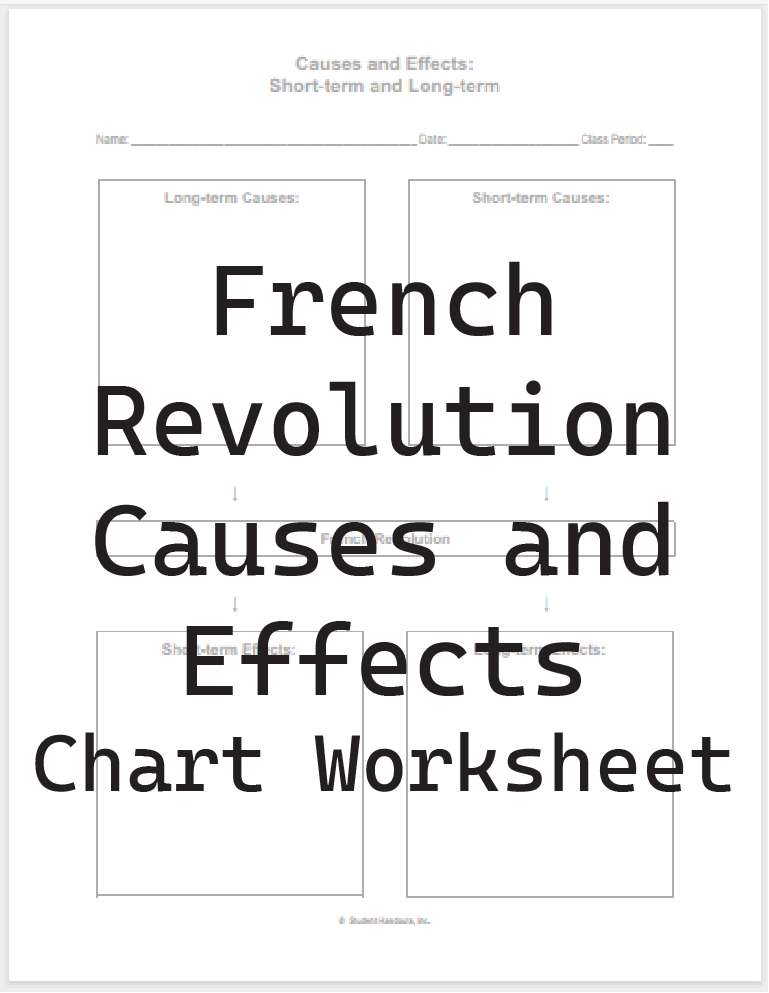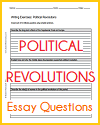Students chart both the long- and short-term causes and effects of the French Revolution.
Click here to print. Answers will vary.
The French Revolution (1789-1799) was a complex and multifaceted event with a wide range of short- and long-term causes and effects. Here is an overview of some of the most significant factors that contributed to the revolution and the far-reaching consequences it had.
Short-Term Causes:
- Economic Crisis: France faced severe financial problems due to the cost of wars, extravagant spending by the monarchy, and a regressive tax system. The country's economic crisis contributed to rising discontent.
- Social Inequality: The French society of the time was divided into three estates, with the clergy and nobility enjoying privileges and tax exemptions, while the common people faced heavy tax burdens and poverty.
- Enlightenment Ideas: The Enlightenment philosophy, with its emphasis on reason, individual rights, and the role of government, influenced many French intellectuals and created a climate of political and social change.
- Famine and Crop Failures: Poor harvests, food shortages, and widespread famine in the late 1780s exacerbated the plight of the French population, leading to desperation and unrest.
- Financial Mismanagement: Attempts by King Louis XVI to implement financial reforms and taxation measures, including summoning the Estates-General, were met with resistance and political deadlock.
Long-Term Causes:
- Absolutist Monarchy: France was ruled by an absolute monarchy, with limited representation and a lack of political rights for the common people. This centralized power structure had persisted for centuries.
- Ancien Régime: The outdated and rigid social structure of the ancien régime, characterized by a hierarchical and unequal system of privileges, hindered social mobility and economic progress.
- Ineffective Government: The French monarchy was plagued by ineffective administration, corruption, and indecision, which eroded the people's trust in the government's ability to address their problems.
Immediate Effects:
- Revolutionary Period: The French Revolution resulted in the establishment of the First Republic and the eventual abolition of the monarchy. It brought about radical changes in the political and social order.
- Reign of Terror: The radical phase of the revolution led to the Reign of Terror, marked by the Committee of Public Safety's authoritarian rule and mass executions, which aimed to suppress counter-revolutionary forces.
- Napoleonic Era: The revolution ultimately paved the way for Napoleon Bonaparte to seize power and establish the First French Empire. This era had a profound impact on France and much of Europe.
Long-Term Effects:
- Spread of Revolutionary Ideas: The French Revolution inspired the spread of revolutionary and democratic ideas across Europe and the world, influencing subsequent political movements and reforms.
- End of Feudalism: The revolution abolished the feudal system, serfdom, and many of the privileges of the clergy and nobility. It also introduced legal equality and secularism.
- Napoleonic Code: Napoléon's legal reforms, including the Napoleonic Code, had a lasting impact on legal systems in many countries, promoting civil liberties and legal equality.
- Nationalism: The idea of the nation-state gained prominence, fostering a sense of national identity and unity among the French people and inspiring nationalist movements in other countries.
- Revolutions and Wars: The French Revolution led to a series of wars, including the Napoleonic Wars, which reshaped the political map of Europe and had a lasting impact on international relations.
- Political Change: The revolutionary era contributed to the development of modern political ideologies and institutions, including the rise of liberalism, conservatism, and nationalism.
- Social and Economic Transformation: The French Revolution had long-term effects on French society, economy, and culture, including the secularization of education and the reorganization of the church.
|



















































